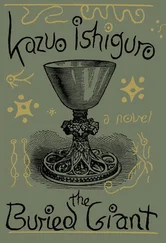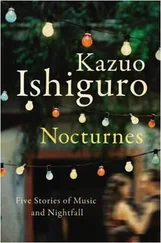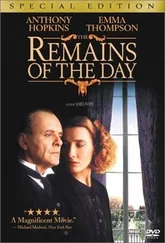“Boys, you must forgive me for listening. But you were right behind me, so I couldn’t help it. Peter, why don’t you tell the others what you were saying to Gordon just now?”
Peter J. looked bewildered and I could see him getting ready his injured innocence face. But then Miss Lucy said again, this time much more gently:
“Peter, go on. Please tell the others what you were just saying.”
Peter shrugged. “We were just talking about what it would feel like if we became actors. What sort of life it would be.”
“Yes,” Miss Lucy said, “and you were saying to Gordon you’d have to go to America to stand the best chance.”
Peter J. shrugged again and muttered quietly: “Yes, Miss Lucy.”
But Miss Lucy was now moving her gaze over the lot of us. “I know you don’t mean any harm. But there’s just too much talk like this. I hear it all the time, it’s been allowed to go on, and it’s not right.” I could see more drops coming off the gutter and landing on her shoulder, but she didn’t seem to notice. “If no one else will talk to you,” she continued, “then I will. The problem, as I see it, is that you’ve been told and not told. You’ve been told, but none of you really understand, and I dare say, some people are quite happy to leave it that way. But I’m not. If you’re going to have decent lives, then you’ve got to know and know properly. None of you will go to America, none of you will be film stars. And none of you will be working in supermarkets as I heard some of you planning the other day. Your lives are set out for you. You’ll become adults, then before you’re old, before you’re even middle-aged, you’ll start to donate your vital organs. That’s what each of you was created to do. You’re not like the actors you watch on your videos, you’re not even like me. You were brought into this world for a purpose, and your futures, all of them, have been decided. So you’re not to talk that way any more. You’ll be leaving Hailsham before long, and it’s not so far off, the day you’ll be preparing for your first donations. You need to remember that. If you’re to have decent lives, you have to know who you are and what lies ahead of you, every one of you.”
Then she went silent, but my impression was that she was continuing to say things inside her head, because for some time her gaze kept roving over us, going from face to face just as if she were still speaking to us. We were all pretty relieved when she turned to look out over the playing field again.
“It’s not so bad now,” she said, even though the rain was as steady as ever. “Let’s just go out there. Then maybe the sun will come out too.”
I think that was all she said. When I was discussing it with Ruth a few years ago at the centre in Dover, she claimed Miss Lucy had told us a lot more; that she’d explained how before donations we’d all spend some time first as carers, about the usual sequence of the donations, the recovery centres and so on—but I’m pretty sure she didn’t. Okay, she probably intended to when she began talking. But my guess is once she’d set off, once she’d seen the puzzled, uncomfortable faces in front of her, she realised the impossibility of completing what she’d started.
It’s hard to say clearly what sort of impact Miss Lucy’s outburst at the pavilion made. Word got round fast enough, but the talk mostly focused on Miss Lucy herself rather than on what she’d been trying to tell us. Some students thought she’d lost her marbles for a moment; others that she’d been asked to say what she had by Miss Emily and the other guardians; there were even some who’d actually been there and who thought Miss Lucy had been telling us off for being too rowdy on the veranda. But as I say there was surprisingly little discussion about what she’d said. If it did come up, people tended to say: “Well so what? We already knew all that.”
But that had been Miss Lucy’s point exactly. We’d been “told and not told,” as she’d put it. A few years ago, when Tommy and I were going over it all again, and I reminded him of Miss Lucy’s “told and not told” idea, he came up with a theory.
Tommy thought it possible the guardians had, throughout all our years at Hailsham, timed very carefully and deliberately everything they told us, so that we were always just too young to understand properly the latest piece of information. But of course we’d take it in at some level, so that before long all this stuff was there in our heads without us ever having examined it properly.
It’s a bit too much like a conspiracy theory for me—I don’t think our guardians were that crafty—but there’s probably something in it. Certainly, it feels like I always knew about donations in some vague way, even as early as six or seven. And it’s curious, when we were older and the guardians were giving us those talks, nothing came as a complete surprise. It was like we’d heard everything somewhere before.
One thing that occurs to me now is that when the guardians first started giving us proper lectures about sex, they tended to run them together with talk about the donations. At that age—again, I’m talking of around thirteen—we were all pretty worried and excited about sex, and naturally would have pushed the other stuff into the background. In other words, it’s possible the guardians managed to smuggle into our heads a lot of the basic facts about our futures.
Now to be fair, it was probably natural to run these two subjects together. If, say, they were telling us how we’d have to be very careful to avoid diseases when we had sex, it would have been odd not to mention how much more important this was for us than for normal people outside. And that, of course, would bring us onto the donations.
Then there was the whole business about our not being able to have babies. Miss Emily used to give a lot of the sex lectures herself, and I remember once, she brought in a life-size skeleton from the biology class to demonstrate how it was done. We watched in complete astonishment as she put the skeleton through various contortions, thrusting her pointer around without the slightest self-consciousness. She was going through all the nuts and bolts of how you did it, what went in where, the different variations, like this was still Geography. Then suddenly, with the skeleton in an obscene heap on the desktop, she turned away and began telling us how we had to be careful who we had sex with. Not just because of the diseases, but because, she said, “sex affects emotions in ways you’d never expect.” We had to be extremely careful about having sex in the outside world, especially with people who weren’t students, because out there sex meant all sorts of things. Out there people were even fighting and killing each other over who had sex with whom. And the reason it meant so much—so much more than, say, dancing or table-tennis—was because the people out there were different from us students: they could have babies from sex. That was why it was so important to them, this question of who did it with whom. And even though, as we knew, it was completely impossible for any of us to have babies, out there, we had to behave like them. We had to respect the rules and treat sex as something pretty special.
Miss Emily’s lecture that day was typical of what I’m talking about. We’d be focusing on sex, and then the other stuff would creep in. I suppose that was all part of how we came to be “told and not told.”
I think in the end we must have absorbed quite a lot of information, because I remember, around that age, a marked change in the way we approached the whole territory surrounding the donations. Until then, as I’ve said, we’d done everything to avoid the subject; we’d backed off at the first sign we were entering that ground, and there’d been severe punishment for any idiot—like Marge that time—who got careless. But from when we were thirteen, like I say, things started to change. We still didn’t discuss the donations and all that went with them; we still found the whole area awkward enough. But it became something we made jokes about, in much the way we joked about sex. Looking back now, I’d say the rule about not discussing the donations openly was still there, as strong as ever. But now it was okay, almost required, every now and then, to make some jokey allusion to these things that lay in front of us.
Читать дальше












